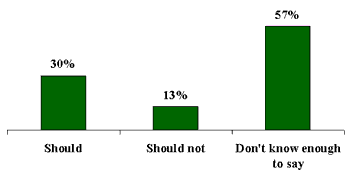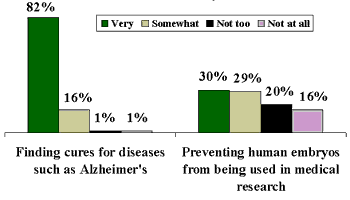GALLUP NEWS SERVICE
PRINCETON, NJ -- President Bush is reported to be weighing conflicting advice about federal funding of embryonic stem cell research, and the pope will most likely lobby him on the subject when the two meet in Europe next week. This is one area about which the president will find little immediate guidance from the American public, however. The reason? Most Americans tell Gallup they are not following the issue closely and do not know enough about the facts involved to render an opinion.
The issue before Bush is whether the federal government should fund medical research using cells obtained from human embryos in the first few days after fertilization (often obtained from fertility clinics); it is controversial because the embryos are destroyed in the process. As a presidential candidate, Bush committed to eliminating this funding, but pressure on him to reverse that stance has been building, most recently from a report issued by the National Institutes of Health (NIH).
Only 38% of Americans, according to a July 10-11 CNN/USA Today/Gallup poll, are following the stem cell research issue very or somewhat closely. This contrasts with 63% who are closely following the story of the disappearance of Washington, D.C. intern Chandra Levy and the 70% or more who in the past have indicated close attention to such policy matters as partial-birth abortion, U.S. involvement in Kosovo, Social Security reforms and the Ford-Firestone tire controversy.
As a result, a clear majority of Americans, 57%, say they "don't know enough to say" when asked whether the federal government should fund the particular kind of stem cell research being debated. Of the remainder, 30% say the government should fund it while 13% disagree.
| Should the Federal Government Fund Stem Cell Research? |
 |
| July 10-11, 2001 |
Curing Diseases Rates as Higher Concern Than Protecting Embryos
While Americans admit to being unfamiliar with the issue, the public does have opinions about some aspects of the stem cell debate. The new poll asks Americans for their personal reaction to the importance of two key issues at stake, and suggests that the critics of the use of embryos in this research could face an uphill battle in convincing the public to embrace their position.
The overwhelming majority of Americans say that finding cures or medical treatments for diseases such as Alzheimer's, diabetes, heart disease and spinal cord injury is very important: 82% feel this way, and another 16% say it is somewhat important.
At the same time, only 30% of Americans consider it very important to prevent human embryos from being used in medical research. Another 29% say this is somewhat important, but more than a third, 36%, say this concern is not important to them. Critics of embryonic stem cell research say it is immoral because it destroys human life, and they argue that there are alternative uses for the embryos.
| How Important Are the Following to You Personally? |
 |
| July 10-11, 2001 |
A different question in the new poll suggests that Americans' desire to see diseases cured may take precedence over their moral concerns about stem cell research. When Americans are asked which of four positions comes closest to their own, a majority, 54%, indicates that embryonic stem cell research is morally wrong. Nevertheless, 69% indicate the research may be necessary. Specifically,
-
- Only 20% of Americans believe the research is morally wrong and unnecessary -- a position held by many critics of the research, who believe that stem cells obtained from umbilical cords or adults may lead to the same cures.
-
- Another 34% also believe the research is morally wrong, but say it may be necessary.
-
- About one-third, 35%, are in agreement with most proponents of the research, saying it may be necessary and is not morally wrong.
-
- Only 4% hold the view that the research is neither necessary nor morally wrong.
Americans Frown on Creation of Embryos for Research
According to AP and Reuters reports, the new NIH report cites two major bases for its support of embryonic stem cell research: that adult stem cells are not as useful as are embryonic stem cells, and that a large number of embryonic stem cells can be generated in the laboratory.
The current poll suggests that while the public may be persuaded by the first argument -- that stem cells obtained from embryos may be uniquely valuable for this research -- the second argument is more controversial. Gallup finds a majority of Americans, 54%, opposed to the fertilization of human eggs specifically for the purpose of generating stem cells. Only 38% favor this.
Another argument that doesn't appear to have much currency with the public is that if this country does not allow the creation of human embryos specifically for research, others will. Only a third of Americans say they are concerned that other countries will gain a competitive advantage over the United States if the U.S. government doesn't allow embryos to be created specifically for research. Sixty-six percent say they are "not too" or "not at all concerned" about this.
If Americans do pay more attention to the embryonic stem cell research issue in the future, it is possible these arguments will suppress their support for it. However, as of today, the subset of Americans who are closely following the issue support it by a wide margin: 55% of the currently attentive group favor it and just 24% are opposed.
Survey Methods
These results are based on telephone interviews with a randomly selected national sample of 998 adults, 18 years and older, conducted July 10-11, 2001. For results based on this sample, one can say with 95 percent confidence that the maximum error attributable to sampling and other random effects is plus or minus 3 percentage points. In addition to sampling error, question wording and practical difficulties in conducting surveys can introduce error or bias into the findings of public opinion polls.
As you may know, the federal government is considering whether to fund certain kinds of medical research known as "stem cell research." How closely have you followed the debate about government funding of stem cell research -- very closely, somewhat closely, not too closely, or not closely at all?
|
Very |
Somewhat closely |
Not too closely |
Not closely |
No |
|
|
2001 Jul 10-11 |
9% |
29 |
28 |
32 |
2 |
Do you think the federal government should or should not fund this type of research, or don't you know enough to say?
|
|
|
Don't know enough to say |
No |
|
|
2001 Jul 10-11 |
30% |
13 |
57 |
* |
|
* Less than 0.5% |
||||
The kind of stem-cell research the government is considering involves human embryos that have been created in medical clinics by fertilizing a woman's egg outside the womb. An embryo may be implanted into a woman's womb to develop into a baby. If an embryo is not implanted into a woman's womb to develop into a baby, it may be destroyed, either by being discarded or by being used for medical research. Some scientists believe this type of medical research could lead to treatments for such diseases as Alzheimer's, diabetes, heart disease and spinal cord injuries. Given this information, do you think the federal government should or should not fund this type of research?
|
Should |
Should not |
No opinion |
|
|
2001 Jul 10-11 |
54% |
39 |
7 |
Which comes closest to your view of this kind of stem cell research -- [ROTATED: it is morally wrong and is unnecessary, it is morally wrong, but may be necessary, it is not morally wrong and may be necessary, (or) it is not morally wrong but is unnecessary]?
|
Morally wrong and is unnecessary |
Morally wrong, may be necessary |
Not morally wrong, may be necessary |
Not morally wrong but is unnecessary |
|
|
|
2001 Jul 10-11 |
20% |
34 |
35 |
4 |
7 |
For each of the following, please tell me if it is -- very important, somewhat important, not too important, or not at all important -- to you personally. How about -- [RANDOM ORDER]?
A. Medical researchers finding cures for diseases such as Alzheimer's, diabetes, heart disease and spinal cord injury
|
Very important |
Somewhat important |
Not too important |
Not at all important |
No |
|
|
2001 Jul 10-11 |
82% |
16 |
1 |
1 |
* |
B. Preventing human embryos from being used in medical research
|
Very important |
Somewhat important |
Not too important |
Not at all important |
No |
|
|
2001 Jul 10-11 |
30% |
29 |
20 |
16 |
5 |
|
* Less than 0.5% |
|||||
COMBINED RESPONSES FROM A AND B ABOVE
|
2001 Jul 10-11 |
|
|
Both important |
58% |
|
Medical research important, not using human embryos in research not important |
35 |
|
Not using human embryos in research important, medical research not important |
1 |
|
Neither important |
1 |
|
Undesignated |
5 |
One of the issues involved in this type of research is whether or not the embryos used were developed specifically for stem cell research. Do you think the federal government should or should not allow scientists to fertilize human eggs specifically for the purpose of creating new stem cells?
|
Yes, should allow |
No, should not |
No opinion |
|
|
2001 Jul 10-11 |
38% |
54 |
8 |
At least one other country currently allows scientists to create human embryos specifically for stem cell research. How concerned are you that other countries will gain a competitive advantage over the U.S. if the government does not allow U.S. scientists to do the same? Are you -- very concerned, somewhat concerned, not too concerned, or not at all concerned?
|
Very concerned |
Somewhat concerned |
Not too concerned |
Not at all concerned |
No |
|
|
2001 Jul 10-11 |
12% |
21 |
33 |
33 |
1 |
